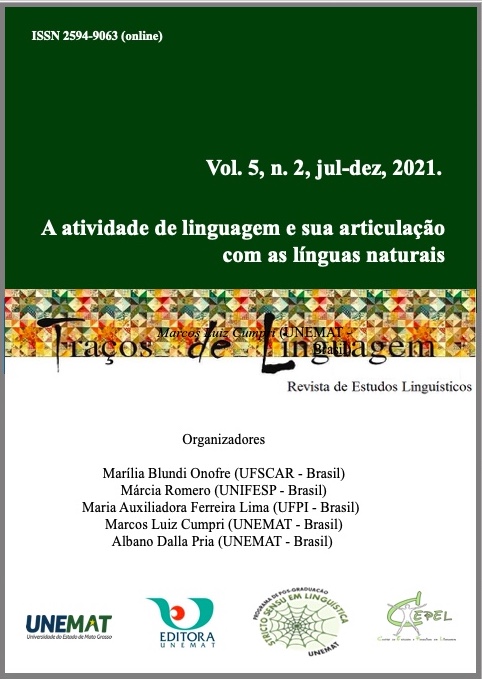To get – is it the equivalent to Brazilian Portuguese’s “coisar”?
DOI:
https://doi.org/10.30681/2594.9063.2021v5n2id6574Keywords:
Get, Theory of Enunciative and Predicatice Operations, Notion, Notional Domain, Foreign Language TeachingAbstract
This article is part of the theoretical model called Theory of Predicative and Enunciative Operations (TOPE), proposed by the French linguist Antoine Culioli (1990). Our goal is to analyze, under Culioli's perspective, the use of the get, one of the most complex verbs in the English language due to its extraordinary polysemy. This feature seriously confuses students and non-native speakers and they often cannot identify the meaning of this verb, as we could empirically observe in our classes and also in consultations with online doubt sites. Based on the Culiolian concepts of notion and notional domain (1985), we also seek to establish a dialogue between the enunciation and the teaching of structures, fields considered antagonistic, in order to find an alternative to teaching guided by mechanistic practices, which we identify as predominant in our schools. To support this discussion, we will use instances of get extracted from a broad variety of sources like the dictionaries Cambridge, Longman and McMillan, lines from songs, film dialogues, our dissertation and examples of our own creation.
Downloads
References
BENVENISTE, Émile. Problemas de Linguística Geral I e II. Campinas: Pontes, 1989.
CAMBRIDGE. Cambridge Dictionary of American English. Cambridge University Press. Nova Iorque. 2000.
CARVALHO, Carolina Tavares de. Linguística de Corpus e suas contribuições para a elaboração de atividades de inglês nos níveis A2 e B1 (QCER). Dissertação de mestrado. São José do Rio Preto, 2021.
CULIOLI, A. Notes du séminaire de D.E.A. 1983–1984. Paris: Poitiers, 1985.
CULIOLI, A. Pour une linguistique de l’énonciation. Paris: Ophrys, 1990.
CULIOLI, A. Pour une linguistique de l’enonciation: operations et représentations. Paris: Ophrys, 2000.
DID YOU GET my message? Intérprete: Mraz, Jason. Compositor: Mraz, Jason & Wilson, Dan. In: MR A-Z. United States: Atlantic Records, 2005. 1 CD laser, faixa 4 (4 min).
GET. In: CAMBRIDGE Dictionary. Cambridge University Press, 2022. Disponível em: https://dictionary.cambridge.org/pt/dicionario/ingles/get. Acesso em: 11/03/2022.
GET. In: LONGMAN Dictionary. Pearson ELT, 2022. Disponível em: https://www.ldoceonline.com/. Acesso em:11/03/2022.
GET. In: MACMILLAN Dictionary. MacMillan Education Limited, 2022. Disponível em: https://www.macmillandictionary.com/dictionary/british/get#get__60. Acesso em 11/03/2022.
LIVING ON my own. Intérprete: Mercury, Freddie. Compositor: Mercury, Freddie. In: MR. BAD GUY. United States: CBS Records, 1984. 1 disco vinil, Lado B, faixa 9 (4 min.).
LATHAM-KOENIG, C. Oxenden, C. American English File. Coleção. 2nd edition. Practice. Oxford: Oxford University Press, 2014.
LIMA, Denilson de. O que significa GET: O famoso coisar da língua inglesa. Disponível em: https://www.inglesnapontadalingua.com.br/2007/01/get-o-famoso-verbo-coisar-da-lngua.html. Acesso em: 25/02/2022.
MUNIZ, Carla. Verbo get. Aprenda de uma vez por todas! Disponível em; https://www.todamateria.com.br/verbo-get/. Acesso em: 25/02/2022.
O VERBO GET E SUAS 1001 UTILIDADES. Disponível em: http://www.interamericano.com.br/o-verbo-get-e-suas-1001-utilidades/. Acesso em 25/02/2022.
O ÚLTIMO dos Moicanos Direção de Michael Mann. Estados Unidos: Warner Home Video, 1992. 1 videocassete.
PASSARELLI, J..D. F. O verbo to get e o ensino de inglês / João Daniel Passarelli França – 2007 111 f. ; 30 cm Dissertação (Mestrado em Lingüística) – Universidade Estadual Paulista, Faculdade de Ciências e Letras, Campus de Araraquara.
PASSARELLI, J. D. F. O ensino de língua estrangeira sob o viés da teoria das operações predicativas e enunciativas: um estudo dos verbos frasais do inglês. 2020. Tese (Doutorado em Linguística) – Centro de Educação e Ciências Humanas, Universidade Federal de São Carlos, São Carlos, 2020.
PASSARELLI FRANÇA, J. D.; ONOFRE, M. B. Diálogos entre enunciação e ensino de língua estrangeira. Estudos Linguísticos (São Paulo. 1978), [S. l.], v. 50, n. 1, p. 337–356, 2021. DOI: 10.21165/el.v50i1.2971. Disponível em: https://revistas.gel.org.br/estudos-linguisticos/article/view/2971. Acesso em: 4 mar. 2022.
REZENDE, L. M. Atividade epilinguística e o ensino de língua portuguesa. Revista do GEL, São Paulo, v. 5, n. 1, p. 95-108, 2008.
RICHARDS, J. C. Hull, J. Proctor, S. Interchange. Coleção. 5th edition. Cambridge: Cambridge University Press, 2017.
SAUSSURE, Ferdinand de. Curso de linguistica geraI. Organizado por Charles Bally, Albert Sechehaye ; com a colaboraçlo de Albert Riedlinger ; prefácio da ediçlo brasileira Isaac Nicolau Salum ; tradução de Antônio ehelini, José Paulo Paes, Izidoro Blikstein. -- 27. Bd. -- São Paulo : CuItrix, 2006.
TRYING TO GET to you. Intérprete: Presley, Elvis. Compositores: Mccoy, Rose Marie & Singleton, Charles. In: Elvis Presley. Estados Unidos. Sun Records. 1956.
VERGARA, Mairo. Verbo get. Como aprender de vez essa joça? Disponível em: https://www.mairovergara.com/verbo-get-em-ingles/ Acesso em: 25/02/2022.
VOGÜÉ, S. de. Culioli após Benveniste: enunciação, linguagem, integração. In: VOGÜÉ, S. de; FRANCKEL, J.J-.; PAILLARD, D. Linguagem e Enunciação – representação, referenciação e regulação. São Paulo: Contexto. 2011.
Downloads
Published
Issue
Section
License
Copyright (c) 2022 Traços de Linguagem - Revista de Estudos Linguísticos

This work is licensed under a Creative Commons Attribution-NonCommercial-ShareAlike 4.0 International License.

